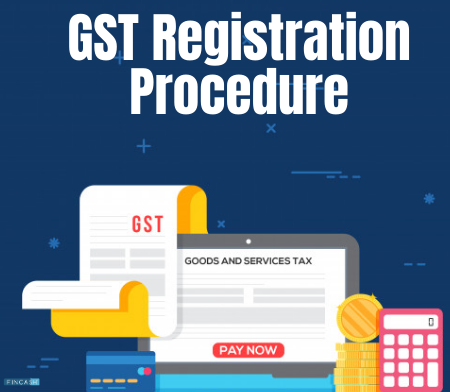Optimizing Your Service Potential With Correct GST Enrollment: Trick Techniques and Finest Practices
In the realm of company operations, the value of proper GST registration can not be overemphasized. It works as a basic column that underpins the financial health and regulative compliance of any type of venture. By browsing the intricate landscape of Goods and Provider Tax with skilled methods and adherence to best methods, companies can open a world of opportunities to prosper and increase. With a thorough strategy to registration kinds, record-keeping, and conformity, firms can not only improve their procedures yet also gain an one-upmanship in the marketplace. The trick to really making best use of the possible lies in the calculated usage of GST mechanisms such as input tax obligation credit history. This vital element, coupled with prompt compliance with filing target dates, can lead the way for continual development and success.
Recognizing GST Basics
Discovering the fundamental principles of Product and Solutions Tax Obligation (GST) is crucial for businesses aiming to navigate the complicated landscape of modern tax systems. Under GST, companies require to comprehend the principle of input tax obligation credit report, which enables them to declare debt for tax obligations paid on their inputs.
Furthermore, companies should understand the distinction between CGST (Central Item and Solutions Tax) and SGST (State Product and Provider Tax Obligation) CGST is accumulated by the main federal government on intra-state materials, whereas SGST is levied by the state government. In Addition, IGST (Integrated Item and Solutions Tax) puts on inter-state deals, guaranteeing seamless tax obligation credit scores throughout the supply chain. Understanding these basic concepts of GST is vital for services to conform with policies, enhance tax planning, and boost their general financial monitoring methods.
Choosing the Right Registration Kind
Optimizing Organization Compliance via Strategic GST Registration Selection is crucial for organizations wanting to run efficiently within the GST structure (Get your GST registration done today in Singapore). Choosing the appropriate registration kind is a vital decision that can influence numerous facets of a business, consisting of conformity requirements, tax obligation responsibility, and operational adaptability
Normal enrollment is appropriate for companies with a yearly turnover exceeding the threshold limit, enabling them to gather taxes from customers and claim input tax obligation credit scores. On the various other hand, the Make-up plan is created for little services with a turnover below the defined restriction, using lower tax prices yet with restrictions on input tax obligation credit history claims.
Maintaining Accurate Records
Establishing careful record-keeping techniques is necessary for companies to make certain compliance with GST guidelines and track economic transactions properly. Maintaining accurate documents not just assists in smooth GST filing however additionally aids in keeping an eye on cash money flow, evaluating company efficiency, and preparing for audits.
Regular reconciliation of monetary documents with financial institution statements and GST returns is critical to recognize any errors or inconsistencies without delay. Services need to also preserve all appropriate documents, such as invoices, agreements, and invoices, to validate their taped transactions. By keeping an efficient record-keeping system, companies can not only follow GST regulations but also gain valuable insights into their monetary health and make informed decisions to drive growth and profitability.
Leveraging Input Tax Credit Rating
Utilizing input tax credit rating effectively can dramatically profit services by decreasing their tax responsibility and boosting money flow management. Input tax obligation debt allows businesses to counter the tax obligation they have paid on inputs versus the tax obligation obligation on outputs. By leveraging input tax obligation credit report, companies can effectively reduce the overall tax obligation problem on their products or solutions, therefore improving their competitiveness in the market.
One trick method to make best use of input tax obligation credit history is to guarantee thorough paperwork and conformity with GST policies. Keeping precise documents of all input anchor taxes paid is crucial for declaring the credit scores without delay and accurately - Get your GST registration done today in Singapore. Organizations ought to consistently reconcile their input tax obligation debt claims with the purchases made to determine any inconsistencies and fix them promptly
One more ideal practice is to keep track of modifications in GST regulations and regulations to stay informed concerning qualified input tax credit report groups and rates. Engaging with tax experts or participating in normal training sessions can help services remain updated on the most recent advancements and maximize their input tax credit scores claims. Eventually, by properly leveraging input tax obligation credit history, companies can enhance their monetary efficiency and competitiveness in the industry.

Adhering To Filing Target Dates
Adherence to declaring deadlines is an important facet of keeping compliance with GST laws for services. Timely submission of GST returns makes sure that organizations fulfill their tax obligations and avoid charges or fines for late filing - Get your GST registration done today in Singapore. It is necessary for companies to maintain track of the various GST declaring due dates based upon their enrollment kind, whether regular imp source monthly, quarterly, or every year, to stop any kind of gaps in conformity
To follow declaring due dates successfully, companies should establish robust internal processes for record-keeping and reconciliation of financial data. Making use of audit software or involving specialist accountants can improve the process and help make certain timely and exact entries. Furthermore, setting up suggestions or signals for upcoming declaring due dates can help businesses remain arranged and prevent last-minute rushes that might cause errors.
Failure to meet GST filing deadlines can cause consequences such as interest costs on superior tax quantities or also lawsuit in serious cases. By focusing on compliance with filing deadlines, organizations can demonstrate excellent administration methods and preserve a favorable connection with tax authorities, promoting trust fund and trustworthiness within business community.

Final Thought
In conclusion, making the most of business possibility with proper GST enrollment includes understanding the essentials of GST, choosing the ideal registration kind, keeping specific documents, leveraging input tax credit rating, and conference filing target dates. By complying with these vital methods and best methods, businesses can make certain compliance with GST laws and optimize their financial performance.
Under GST, organizations need to comprehend the principle of input tax obligation credit report, which enables them to claim credit report for tax obligations paid on their inputs. Routine registration is appropriate for organizations with a yearly turnover exceeding the threshold limitation, permitting them to accumulate tax obligations from clients and claim input tax credit ratings. Input tax credit score permits businesses to offset the tax they have paid on inputs against the tax obligation on outcomes. By leveraging input tax obligation reference credit, companies can properly reduce the general tax concern on their goods or services, therefore enhancing their competition in the market.
Involving with tax obligation experts or going to normal training sessions can aid organizations remain upgraded on the most current advancements and enhance their input tax credit score cases.